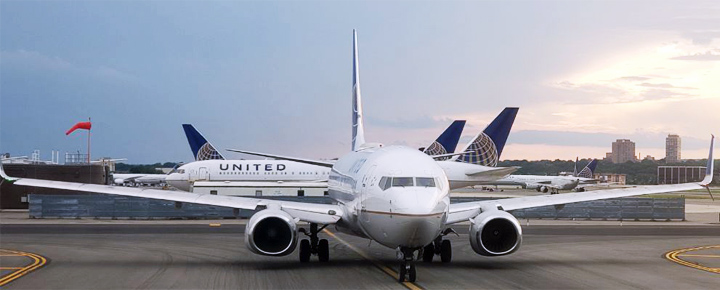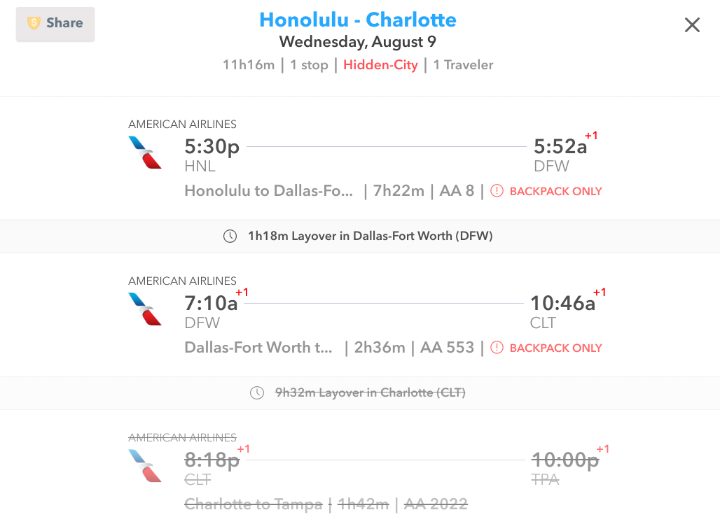We’ve written before about the practice of using “hidden city” tickets to Hawaii. On a recent flight from Lihue to Los Angeles the price was outrageous. But then we found a ticket on American Airlines from Lihue to San Diego, with a stop in Los Angeles, for one-half the price. We thought about buying that ticket, flying with only carry-on luggage, and then getting off the plane in Los Angeles. End of issue, right? Not according to the airlines, the courts, and what just happened this week.
What happened to this skiplagging teenager.
Hunter Parsons said he bought a flight for his son from Gainesville to NYC with a layover in Charlotte. The man told his son to get off in Charlotte, which was the real destination where his father lives. It was the son’s first time flying alone as well.
His father said that we’ve “used Skiplagged almost exclusively for the last five to eight years.”
What happened next is that the gate agent reportedly was suspicious about the teen’s actual destination. The father reported that his son was “Interrogated a little bit, ultimately taken to a security room. They kind of got out of him that he was planning to disboard in Charlotte and not going to make the connecting flight.” The teen’s father indicated that he wasn’t aware of how negatively the airlines viewed this practice.
As a result, American canceled the teen’s ticket, and a new ticket was required. The father felt it was unfair to leave the child in such a predicament. “Our concerns are he is a minor and was kind of left to fend for himself several states away.”
We do see the airlines’ position of working with a minor in this circumstance, as they would be responsible for ensuring that the passenger makes it to the point of turning them over to another responsible adult. And we aren’t sure that this would have made the news again in quite this way if it weren’t for that complexity.
To our knowledge, however, the airlines have never prevailed legally regarding skiplagging. American, however, says that “Purchasing a ticket without intending to fly all flights to gain lower fares (hidden city ticketing) is a violation of American Airlines terms and conditions and is outlined in our Conditions of Carriage online. Our Customer Relations team has been in touch with the customer to learn more about their experience.”
Are gate agents the enforcers?
United Airlines, American Airlines, and others want their airport agents to become monitors of the long-standing and not illegal practice of skiplagging. They still fear it is a potentially growing trend for travelers to and from Hawaii (and elsewhere) to buy tickets to final destinations they will never see. UAL wants agents to report suspected violators of their terms to their corporate security. That’s based on a previous internal memo that went public.
Such practices have been quite widespread for as long as we can remember. Editor Jeff remembers once years ago buying a ticket with a flight that started in Harare because a travel agent said it would work and save him a lot of money. That was a long time ago and, while the trick was unfamiliar to him, it worked like a charm. Hidden city ticketing to and from Hawaii among other places has existed for decades. While the airlines have always hated it, and felt it was a violation of their terms of carriage, the practice has nonetheless endured among some savvy consumers.

United Airlines position.
United Airlines told employees, “This practice can potentially offer discounts on airfare and is not aligned with United’s contract of carriage. As the practice grows, we need to ensure that we’re both supporting our customers and properly enforcing the contract of carriage rules and United policies.” United Airlines further stated that “it is against our ticketing policies to purchase an additional segment with no intention to fly.”
United is asking employees to use discretion. What if the traveler has a medical condition that necessitates their not continuing? But when that isn’t the situation, United is asking their agents to alert the airline’s corporate security: “Our priority is to safely get our customers and their baggage to their final destinations, so always try to understand the customer’s situation and avoid confrontation when handling hidden city ticketing instances. Corporate security is better positioned to follow up on the situation and take appropriate action to ensure customers are following contract of carriage rules and United policies.”
United has threatened to seek reimbursement from those who are repeat offenders and asserted their right to take action, including the use of a collection agency to recoup lost income, termination of the passenger’s frequent flyer status, or banning them from the airline entirely.
Editor Rob coincidentally needs to get to a meeting in Charlotte. The problem is that the price is about $800 one-way from Honolulu later this month. In preparing this article he also decided to at least check on the Skiplagged website and found that with their plan, he would pay less than half ($396). The way it would work is that Rob would buy a ticket to Tampa that stops in Charlotte, and simply not board the final leg from Charlotte to Tampa. In the end, Rob did not buy the skiplagged ticket. You can see the offer in the image below.

The issue of skiplagging.
This issue was brought to the forefront several years ago in part due to the Skiplagged website, which United sued unsuccessfully. That site helps consumers locate the best deals using hidden city destinations. There have been rumors that other websites intend to follow the Skiplagged practice.
While the airlines assert that this practice breaks their pricing system, Skiplagged says that consumers who buy tickets should be able to do as they please with them, including not completing the journey if they so choose.
No checked bags and other rules!
1. No checked bags. Travelers who don’t understand or forget, may inadvertently check bags to their final destination. Obviously, you can’t tell the airline you aren’t taking that last connecting flight.
2. One-way or return flights only. This only works on one-way tickets or on the return portion of a round-trip ticket. Otherwise, if you miss a flight on your outbound trip, the airline might cancel the rest of the reservation.
3. Should your itinerary get re-routed, there is some possibility you too might not end up where you expected.
What are your thoughts on this skiplagging practice?






Leave A Comment